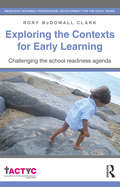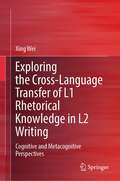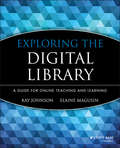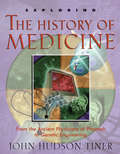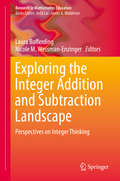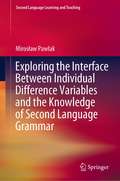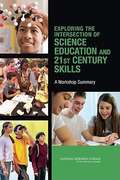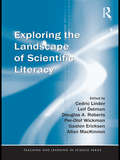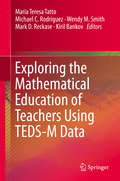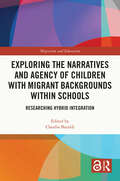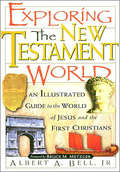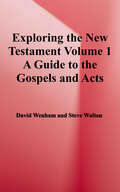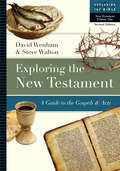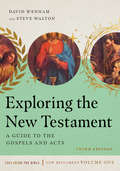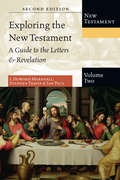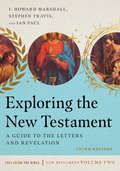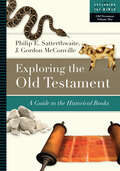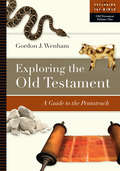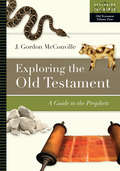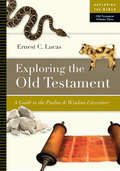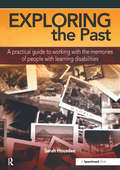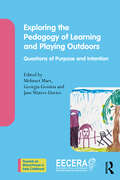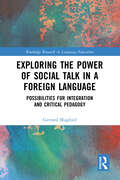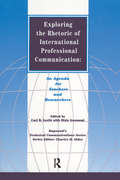- Table View
- List View
Exploring the Contexts for Early Learning: Challenging the school readiness agenda (TACTYC)
by Rory McDowall ClarkThe concept of ‘readiness for school’ is attractive to policy-makers, but many academics, researchers and practitioners argue that an early start to formal learning may be misguided. This book introduces readers to an increasing body of evidence which demonstrates that young children need opportunities to learn and develop in environments that support their emotional and cognitive needs, offering opportunities to develop autonomy, competence and self-regulation skills. With advice on implementing research findings in practice, this book provides clear guidance on how to foster and develop these attributes, scaffold steps into new areas of learning and support children in facing new challenges. Chapters cover: Policy and discourses; Taking account of development; Approaches to Early Years Learning; The Diversity of Children’s Early Experiences; Transitions and starting school; Where to in the Future? Exploring the Contexts for Early Learning will be essential reading for students, practitioners, policy-makers and all those interested in the school readiness agenda.
Exploring the Cross-Language Transfer of L1 Rhetorical Knowledge in L2 Writing: Cognitive and Metacognitive Perspectives
by Xing WeiThis book addresses the transfer of rhetorical knowledge from a first language (L1) to a second language (L1-to-L2 rhetorical transfer), a common cognitive phenomenon in the L2 writing of students in foreign language learning environments. It investigates L1-to-L2 rhetorical transfer from a cognitive perspective and examines a specific component of L2 writers’ agency in this transfer, namely metacognition. The book’s ultimate goal is to enhance our understanding of the cognitive mechanism of rhetorical transfer across languages. This goal is in turn connected to the need to determine how L1 rhetorical knowledge can be steered and oriented toward successful L2 writing.To this end, this book proposes a theoretical framework for transfer studies, encompassing the dimensions of text, transfer agency, and L2 essay raters. It facilitates an in-depth exploration of the intricacies involved in L1-to-L2 rhetorical transfer. It then presents empirical studies on this transfer. Embracing a dynamic perspective, this book furthers our understanding of interlingual rhetorical transfer as a conscious or intuitive process for making meaning, one that can be monitored and steered. Moreover, it discusses the pedagogical implications for L2 writing instruction that guides students to use metacognition to transfer L1 rhetorical knowledge during L2 writing.
Exploring the Depths of God's Love (Life Principles Study Series)
by Charles F. StanleyFor God so loved the world … and then what?John 3:16 is one of the first verses you learn in Sunday School, but do you really understand what that means? In Exploring the Depths of God's Love, Dr. Stanley guides you through the basic message of the Scriptures, offering practical guidelines for living and understanding God's love. You'll learn what it really means to love God and to serve and obey Him and as a result, you'll discover how much God loves you, and how His love will transform you forever.With over 1 million copies sold, the Charles F. Stanley Bible Study Series is a unique approach to Bible study, incorporating biblical truth, personal insights, emotional responses, and a call to action.Each study draws on Dr. Stanley's many years of teaching the guiding principles found in God's Word, showing how we can apply them in practical ways to every situation we face.Each of the ten lessons includes:A brief look at what is covered in the lesson.A teaching from Dr. Stanley that unpacks the topic of the lesson.Application and Bible study questions based on the key points.Key takeaways to put into practice today and tomorrow.
Exploring the Digital Library
by Johnson Elaine Kay MagusinExploring the Digital Library, a volume in The Jossey-Bass Online Teaching and Learning series, addresses the key issue of library services for faculty and their students in the online learning environment. Written by librarians at Athabasca University, a leading institution in distance education, this book shows how faculty can effectively use digital libraries in their day-to-day work and in the design of electronic courses. Exploring the Digital Library is filled with information, ideas, and Discusses how information and communication technologies are transforming scholarship communication Provides suggestions for integrating digital libraries into teaching and course development Describes approaches to promoting information literacy skills and integrating these skills across the curriculum Outlines the skills and knowledge required in digital library use Suggests opportunities for faculty and librarians to collaborate in the online educational environment
Exploring the History of Medicine
by John Hudson TinerFrom surgery to vaccines, man has made great strides in the field of medicine. Quality of life has improved dramatically in the last few decades alone, and the future is bright. But students must not forget that God provided humans with minds and resources to bring about these advances. A biblical perspective of healing and the use of medicine provides the best foundation for treating diseases and injury. In Exploring the World of Medicine, author John Hudson Tiner reveals the spectacular discoveries that started with men and women who used their abilities to better mankind and give glory to God. The fascinating history of medicine comes alive in this book, providing students with a healthy dose of facts, mini-biographies, and vintage illustrations. Includes chapter tests and index.
Exploring the Integer Addition and Subtraction Landscape: Perspectives on Integer Thinking (Research in Mathematics Education)
by Laura Bofferding Nicole M. Wessman-EnzingerOver the past few decades there has been increased interest in how students and teachers think and learn about negative numbers from a variety of perspectives. In particular, there has been debate about when integers should be taught and how to teach them to best support students’ learning. This book brings together recent work from researchers to illuminate the state of our understanding about issues related to integer addition and subtraction with a goal of highlighting how the variety of perspectives support each other or contribute to the field in unique ways. In particular, this book focuses on three main areas of integer work: students’ thinking, models and metaphors, and teachers’ thinking. Each chapter highlights a theoretically guided study centered on integer addition and subtraction. Internationally known scholars help connect the perspectives and offer additional insights through section commentaries. This book is an invaluable resource to those who are interested in mathematics education and numerical thinking.
Exploring the Interface Between Individual Difference Variables and the Knowledge of Second Language Grammar (Second Language Learning and Teaching)
by Mirosław PawlakThe last few decades have seen extensive research focusing of the relative effectiveness of different instructional options that can be employed in teaching grammar structures (e.g., deduction and induction, different types of corrective feedback, input-based vs. output-based practice). However, the contribution of such pedagogical intervention and the resulting knowledge of target language grammar are mediated by a number of factors related to a specific context, the properties of the features being taught and, most importantly, individual learner profiles. Nonetheless, research into the moderating role of individual difference variables has been scant, limited to only several factors, and seldom taking into account complex interactions between variables. The book seeks to fill this evident gap by investigating the mediating effect of selected cognitive and affective factors on explicit and implicit (or highly automatized) knowledge of the English passive voice. In doing so, the study sheds the so-much-needed light on the predictors of second language grammar knowledge but also, to some extent, on the usefulness of instructional techniques used to develop it.
Exploring the Intersection of Science Education and 21st Century Skills: A Workshop Summary
by National Research Council of the National AcademiesAn emerging body of research suggests that a set of broad "21st century skills"--such as adaptability, complex communication skills, and the ability to solve non-routine problems--are valuable across a wide range of jobs in the national economy. However, the role of K-12 education in helping students learn these skills is a subject of current debate. Some business and education groups have advocated infusing 21st century skills into the school curriculum, and several states have launched such efforts. Other observers argue that focusing on skills detracts attention from learning of important content knowledge. To explore these issues, the National Research Council conducted a workshop, summarized in this volume, on science education as a context for development of 21st century skills. Science is seen as a promising context because it is not only a body of accepted knowledge, but also involves processes that lead to this knowledge. Engaging students in scientific processes--including talk and argument, modeling and representation, and learning from investigations--builds science proficiency. At the same time, this engagement may develop 21st century skills. Exploring the Intersection of Science Education and 21st Century Skills addresses key questions about the overlap between 21st century skills and scientific content and knowledge; explores promising models or approaches for teaching these abilities; and reviews the evidence about the transferability of these skills to real workplace applications.
Exploring the Landscape of Scientific Literacy (Teaching and Learning in Science Series)
by Cedric LinderScientific literacy is part of national science education curricula worldwide. In this volume, an international group of distinguished scholars offer new ways to look at the key ideas and practices associated with promoting scientific literacy in schools and higher education. The goal is to open up the debate on scientific literacy, particularly around the tension between theoretical and practical issues related to teaching and learning science. Uniquely drawing together and examining a rich, diverse set of approaches and policy and practice exemplars, the book takes a pragmatic and inclusive perspective on curriculum reform and learning, and presents a future vision for science education research and practice by articulating a more expansive notion of scientific literacy.
Exploring the Mathematical Education of Teachers Using TEDS-M Data
by Maria Teresa Tatto Michael C. Rodriguez Wendy M. Smith Mark D. Reckase Kiril BankovThis book uses the publicly available TEDS-M data to answer such questions as: How does teacher education contribute to the learning outcomes of future teachers? Are there programs that are more successful than others in helping teachers learn to teach mathematics? How does the local and national policy environment contribute to teacher education outcomes? It invites readers to explore these questions across a large number of international settings. The importance of preparing future mathematics teachers has become a priority across many nations. Across the globe nations have allocated resources and expertise to this endeavour. Yet in spite of the importance accorded to teacher education not much is known about different approaches to preparing knowledgeable teachers and whether these approaches do in fact achieve their purpose. The Mathematics Teacher Education and Development Study (TEDS-M) is the first, and to date the only, cross-national study using scientific and representative samples to provide empirical data on the knowledge that future mathematics teachers of primary and secondary school acquire in their teacher education programs. The study addresses the central importance of teacher knowledge in learning to teach mathematics by examining variation in the nature and influence of teacher education programs within and across countries. The study collected data on teacher education programs structure, curriculum and opportunities to learn, on teacher educators’ characteristics and beliefs, and on future mathematics teachers’ individual characteristics, beliefs, and mathematics and pedagogical knowledge across 17 countries providing a unique opportunity to explore enduring questions in the field.
Exploring the Narratives and Agency of Children with Migrant Backgrounds within Schools: Researching Hybrid Integration (Migration and Education)
by Claudio BaraldiThis edited volume presents the results of a European research project – ‘CHILD-UP’ (Children Hybrid Integration: Learning Dialogue as a way of Upgrading Policies of Participation), which analyses the hybrid integration of children with migration backgrounds into schools across Europe. Using qualitative data and theoretical foundations obtained through interviews and focus groups, the book ultimately centres the perspectives and experiences of both the children and the professionals working with them. In doing so, it explores the complex position migrant children occupy in host societies, their exercise of agency, challenges and inspirational local practices that support hybrid integration and innovative educational planning. It also analyses the facilitation of conversations concerning children’s personal experiences and social relations, second language learning and language mediation, based on video- and audio-recordings of school activities. The book will be of relevance to researchers, academics, scholars, and faculty in the fields of sociology of education, child development, migration and multicultural studies.
Exploring the New Testament World
by Albert BellThe timeless message of the New Testament applies to people of every culture and generation. Yet there is great value in understanding the world in which that message was first revealed - its social manners, politics, religious customs, and culture. Exploring the New Testament World, written by classics and Bible scholar Dr. Albert A. Bell, Jr., illuminates the living context of the New Testament, immersing its readers in the intriguing world of Jesus and the early church. An authority on ancient Greek and Roman language, culture, and history, Dr. Bell writes in a readable style that is accessible and enjoyable to any reader - an uncommon accomplishment among New Testament scholars today. Surveying Jewish factions of the era, the social and political structure of the Roman Empire, and the philosophies and religions that surrounded the early church, Dr. Bell helps his readers learn to think like first-century Jews, Greeks, and Romans, illuminating puzzling New Testament passages for clear understanding. Comprehensive Scripture and Subject Indexes make this volume even more useful as a "manners and customs" Bible companion. This authoritative guide receives high praise from college professors and Sunday school teachers alike, proving its appeal to both popular and academic audiences. A "must-have" reference for every pastor and an indispensable resource to any Bible reader.
Exploring the New Testament: A Guide to the Gospels and Acts (Exploring The Bible Ser.)
by Steve Walton David WenhamWritten by scholars with extensive experience teaching in colleges and universities, the Exploring the Bible series has for decades equipped students to study Scripture for themselves. Exploring the New Testament, Volume One provides an accessible introduction to the Gospels and Acts. It's filled with classroom-friendly features such as discussion questions, charts, theological summary sidebars, essay questions, and further reading lists. This volume introduces students to -Jewish and Greco-Roman background -literary genres and forms -issues of authorship, date, and setting -the content and major themes of each book -various approaches to the study of the Gospels and Acts -the intersection of New Testament criticism with contemporary faith and culture Now in its third edition, this popular textbook has been updated and revised to take account of the latest advances in scholarly findings and research methods, including new sections on -the impact of social memory theory on Gospel studies -the relationship of John's Gospel to the Synoptics -recent work on characterization in narrative studies of the Gospels -the way the Hebrew Scriptures are read by the New Testament authors -the contribution of archaeology to New Testament studies -updated bibliographies highlighting the most important and influential works published in the last decade Especially suited as a textbook for courses on Jesus, the Gospels, or Acts, this book is a valuable guide for anyone seeking a solid foundation for studying the New Testament.
Exploring the New Testament: A Guide to the Gospels and Acts (Exploring the Bible Series #Volume 1)
by Steve Walton David WenhamEspecially suited for introductory courses that focus on Jesus and the Gospels or the Gospels and Acts, Exploring the New Testament, Volume One introduces students to Jewish and Greco-Roman background literary genres and forms debated issues such as authorship, date and setting content and major themes of each book conventional as well as new approaches to the study of the Gospels and Acts the latest scholarship in the quest for the historical Jesus the intersection of New Testament criticism with contemporary faith and culture This revised edition features updated text and bibliographies, and incorporates new material gleaned from the experience of classroom use.
Exploring the New Testament: A Guide to the Gospels and Acts (Exploring the Bible Series #Volume 1)
by Steve Walton David WenhamJewish and Greco-Roman backgroundliterary genres and formsissues of authorship, date, and settingthe content and major themes of each bookvarious approaches to the study of the Gospels and Actsthe intersection of New Testament criticism with contemporary faith and culturethe impact of social memory theory on Gospel studiesthe relationship of John's Gospel to the Synopticsrecent work on characterization in narrative studies of the Gospelsthe way the Hebrew Scriptures are read by the New Testament authorsthe contribution of archaeology to New Testament studiesupdated bibliographies highlighting the most important and influential works published in the last decade
Exploring the New Testament: A Guide to the Letters and Revelation (Exploring the Bible Series #Volume 2)
by I. Howard Marshall Ian Paul Stephen TravisProfessors and students will warm to this clearly written and well-informed introduction to the New Testament Letters and the Apocalypse. Exploring the New Testament, Volume Two introduces students of biblical studies and theology to Greco-Roman background ancient letter writing content and major themes Paul's life, mission and theology issues of authorship, date and setting methods in reading and interpreting the New Testament Letters and Revelation the intersection of New Testament criticism with contemporary issues of faith and culture This revised edition features updated text and bibliographies, and incorporates new material gleaned from the experience of classroom use.
Exploring the New Testament: A Guide to the Letters and Revelation (Exploring the Bible Series #Volume 2)
by I. Howard Marshall Ian Paul Stephen TravisJewish and Greco-Roman backgroundPaul's life, mission, and theologythe structure and major themes of each bookissues of authorship, date, and settingmethods in reading and interpreting the Letters and Revelationthe intersection of New Testament criticism with contemporary issues of faih and culturethe theological links between Jesus and Paulthe way New Testament authors read the Hebrew Scripturesthe contribution of archaeology to New Testament studiesupdated bibliographies highlighting the most important and influential works published in the last decade
Exploring the Old Testament: A Guide to the Historical Books (Exploring the Bible Series #Volume 2)
by Philip E. Satterthwaite J. Gordon McConvilleThe historical books, from Joshua to Ezra and Nehemiah, form the narrative backbone of the Old Testament. Without them the Pentateuch would stop cold and the Prophets would hang in suspension. Even the Psalms and Wisdom literature would lose some of their luster for lack of a setting. Without these historical books the New Testament would be resolving an incomplete narrative, answering a question only half and hesitantly posed. For all these reasons and more, it is a tragic fact that many of us today cannot give a brief and coherent account of this story. We fear that books with names like Judges, Kings and Chronicles would bore us. But nothing could be further from the truth. For the story they tell is full of action and intrigue, tragedy and suspense, vivid characters and memorable events. They are the stuff of great art and literature, and they have inspired men and women to lives and deeds of uncommon faith and courage. Exploring these books is essential for a true education, whether religious or otherwise. In this guidebook, Philip E. Satterthwaite and J. Gordon McConville introduce us to the content and the context of these historical books. We view them within the setting of ancient history and history writing, and come to appreciate their literary artistry, their role within the Scriptures of Israel, and their lasting value as theological and ethical resources. Designed especially for students, Exploring the Old Testament, Volume 2: A Guide to the Historical Books overflows with interesting and helpful features that encourage avid exploration and the joy of learning.
Exploring the Old Testament: A Guide to the Pentateuch (Exploring the Bible Series #Volume 1)
by Gordon J. WenhamExploring the Old Testament: A Guide to the Pentateuch offers a clear overview of the "five books of Moses," as well as an introduction to the historical and textual questions that modern scholarship has posed and the answers it has proposed. This critically informed, textually sensitive introduction to the Pentateuch introduces students to the basic features of the Pentateuch the social world of the Bible the latest scholarship on the composition of the Pentateuch literary techniques and forms theme, composition and rhetorical function of the Pentateuch In this textbook you will find double-column formatting for ease of use, annotated bibliographies for further reading, sidebar explorations of select historical and textual topics in greater detail, a glossary of terms, and relevant charts and maps.
Exploring the Old Testament: A Guide to the Prophets (Exploring the Bible Series #Volume 4)
by J. Gordon McConvilleExploring the Old Testament: A Guide to the Prophets considers the often misunderstood prophetic books of the Old Testament, including an exploration of their historical context, their artful use of language and their place within the chorus of Old Testament voices. This critically informed and theologically sensitive introduction to the Prophets introduces students to issues in critical interpretation the place of the prophetic books in the Old Testament canon the social location of biblical prophets contemporary applications of the prophetic books dates and destinations of the prophecies of each of the books theological contributions of the prophetic books an overview of literary criticism on the Prophets In this textbook you will find double-column formatting for ease of use, annotated bibliographies for further reading, sidebar explorations of select historical and textual topics in greater detail, a glossary of terms, and relevant charts and maps.
Exploring the Old Testament: A Guide to the Psalms Wisdom Literature (Exploring the Bible Series #Volume 3)
by Ernest C. LucasIsrael's poets and sages left a scriptural legacy that has powerfully shaped the worship, thoughts and actions of the people of God. In the highs and lows and crossroads of life, we instinctively turn to their poetry, proverbs and discourses for the language we do not possess and the wisdom we desperately seek. Yet there is more to this literature than meets the eye--or fills the momentary need. A study of the Bible's wisdom and poetry will dramatically enhance its power and effectiveness. From the depths of lament to the heights of praise, from the eroticism of the Song of Songs to the hard realism of Ecclesiastes, and from the aphorisms of Proverbs to the discourses of Job, this guide introduces readers to the ancient background, the literary artistry, and the varied and timeless messages of the Psalms and Wisdom literature. Ernest C. Lucas gives us an informed, illuminating and interactive introduction to this portion of Scripture. Sparkling with interest and geared to the needs of students, this is an excellent textbook introduction to the Psalms and Wisdom literature.
Exploring the Past: A Practical Guide to Working with the Memories of People with Learning Disabilities
by Sarah HousdenWorking from the premise that the lives of people with learning disabilities are of innate value, and that exploring and celebrating people's experiences demonstrates their value in a practical way, this book provides a manual on working with memories in groups and individually. It includes: a clear rationale for and guidance on the benefits of this approach; good practice guidelines for memory work; a chapter on life story work with individuals; a section on working with those with learning disabilities and dementia; ideas for dozens of activities on 15 themes associated with memories of the past, including - the childhood years; food, cooking and shopping; days out and holidays; fashions, clothing and looking good; and, hobbies, interests and work experience.
Exploring the Pedagogy of Learning and Playing Outdoors: Questions of Purpose and Intention (Towards an Ethical Praxis in Early Childhood)
by Jane Waters-Davies Mehmet Mart Georgia GessiouFocusing on the empirical evidence base for pedagogical decisions taken when children are playing and learning outside, this groundbreaking book examines the intention and purpose of children’s outdoor playful activity and the associated issues of pedagogy. Chapters address questions about the role of the adult in children’s learning outside in a manner that is inclusive in nature, by recognising the varied contexts in which children’s playful activity outside takes place. Reflecting multiple cultural contexts, chapters consider social and physical aspects to ensure value systems are visible and critically considered. The book acknowledges the continuum of children’s outdoor experience from highly structured activity to free play outside. It also examines the existing evidence base about children’s outdoor play, including a consideration of how adults construct and respond to children’s playful activity outside to realise the associated benefits. With reference throughout to many international contexts, this book reminds us of the shaping force of cultural practices and beliefs about children’s playful activity outside and will be of interest to undergraduate and postgraduate audiences studying early childhood education.
Exploring the Power of Social Talk in a Foreign Language: Possibilities for Integration and Critical Pedagogy (Routledge Research in Language Education)
by Gerrard MugfordThis book examines the fundamental interactional dimension to foreign language communication, including the establishment, development, consolidation and maintenance of interpersonal relations. It argues that interpersonal language use such as small talk, casual conversation and gossipy talk is not only key to meaningful and productive communication but that it is an essential dimension with respect to successful foreign language interaction and that engaging in interpersonal language is communicatively valuable and worthwhile in its own right. Crucially, it explores how teaching and learning can utilize the role of social talk and relational engagement in helping interactants to express, voice and convey their own values, attitudes and beliefs. Finally, it develops a critical relational pedagogy focused on language speakers’ needs, objectives and desires. Redressing the imbalance between transactional and interactional language teaching, and stressing the importance of phatic and relational language use in helping language users achieve their communicative goals, it will appeal to researchers, postgraduates, and scholars in the fields of education and linguistics.
Exploring the Rhetoric of International Professional Communication: An Agenda for Teachers and Researchers (Baywood's Technical Communications)
by Carl R. Lovitt Dixie GoswamiPresents a collection of fourteen essays that responds to the need for a more rhetorical conception of professional communication as an international discipline. This book challenges the adequacy of relying on preconceived notions about the factors that determine discourse in international professional settings.
